I bought our elderly, retired farm dog, Ben, a new bed last week. It’s one of those memory foam dog beds which is meant to help soothe old joints. Having been the hardest (and – no offense to my husband – but also the cutest) worker on our farm for many years, you can tell poor Ben’s joints ache. I placed the new bed in the spot, at the bottom of our stairs, where he likes to sleep and couldn’t wait to see him snuggle in and relax (as much as a border collie can ever relax).
The thing is, Ben didn’t like the new bed. He didn’t complain – he just quietly moved to another spot on the floor.
How do you make a dog understand: this is going to help give you a better quality of life!? I’ll tell ya. You don’t. At first, I physically lifted him onto to the bed so that his head and front paws were on it. I thought that might entice him. Nope. He moved over to his other favourite spot, under the table, next to my feet, while I work.
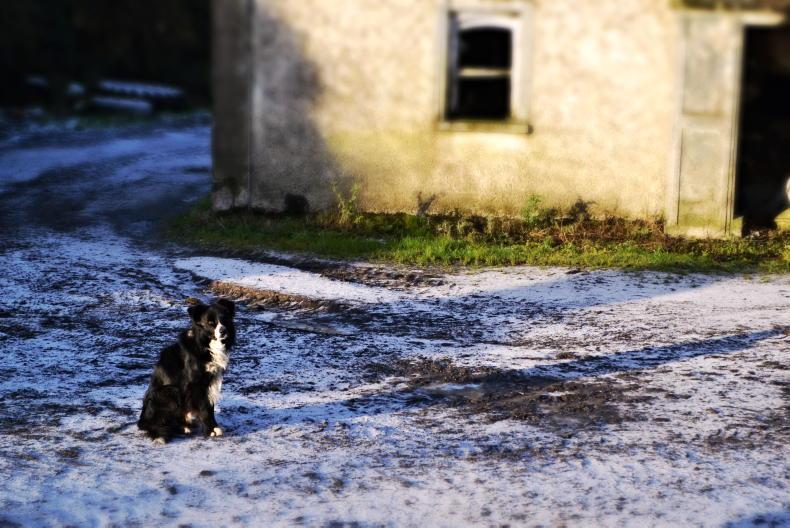
Ben in his younger years, in front of one of Janine's derelict farm buildings \ Janine Kennedy
Although very gentle – especially for a working dog – Ben has always been fearful of people and new experiences. He likes what he likes and knows what he knows. Like so many of us, he fears the unknown. But what if the unknown brings wonderful (or potentially helpful) things? Is living in fear worth the energy and anxiety? Of course, a little bit of fear isn’t a bad thing – it keeps us safe and enabled our survival as a species. But things get problematic when you let your fears dictate your life.
Although very gentle – especially for a working dog – Ben has always been fearful of people and new experiences. He likes what he likes and knows what he knows. Like so many of us, he fears the unknown.
I have lived with fear and anxiety for much of my life and it’s taken lots of hard work to learn to be ok with the unknown (or sort-of ok – it’s a work in progress!). It’s difficult to not be in control. Seeing the recent floods in New York city, forest fires all over Canada and dangerous heat waves throughout Europe makes me want to bury my head in the sand. I mean, the world is a scary place right now and we farmers face a lot of uncertainty. But this doesn’t do me or anyone else any good.
Research has shown that living in a state of fear can impact your ability to learn. It affects the part of the brain which stores information; meaning it might distort information as you process it. By learning to be ok with the unknown, we are better able to take in new information – and sometimes, revisit older methodology and tradition to see what might work for the future.
This is part of what I enjoyed about talking with Harrison Gardner for our cover feature this week, he is a calming force. He sees an old, unused building and understands the history behind it; the care and effort which went into its design. He cherishes traditional methodology and believes farmers have the tools to do a lot of good for the future. We certainly have several outbuildings on the farm which could be spruced up and I am really looking forward to his presentation at our Women & Agriculture conference on 25 October in the Lyrath Hotel, Kilkenny.
As for Ben, it took for a few days, but last night as I started toward the stairs for bed, I found him comfortably curled up on his new memory foam mattress.
Maybe it didn’t smell unfamiliar to him anymore; maybe he needed to test out a paw or two before deciding the bed was for him. Maybe you can, in fact, teach an old dog new tricks.
Read more
Editorial: when all else fails, the compost heap provides
Editorial: become a woman in ag ain't easy, but it is worthwhile
I bought our elderly, retired farm dog, Ben, a new bed last week. It’s one of those memory foam dog beds which is meant to help soothe old joints. Having been the hardest (and – no offense to my husband – but also the cutest) worker on our farm for many years, you can tell poor Ben’s joints ache. I placed the new bed in the spot, at the bottom of our stairs, where he likes to sleep and couldn’t wait to see him snuggle in and relax (as much as a border collie can ever relax).
The thing is, Ben didn’t like the new bed. He didn’t complain – he just quietly moved to another spot on the floor.
How do you make a dog understand: this is going to help give you a better quality of life!? I’ll tell ya. You don’t. At first, I physically lifted him onto to the bed so that his head and front paws were on it. I thought that might entice him. Nope. He moved over to his other favourite spot, under the table, next to my feet, while I work.

Ben in his younger years, in front of one of Janine's derelict farm buildings \ Janine Kennedy
Although very gentle – especially for a working dog – Ben has always been fearful of people and new experiences. He likes what he likes and knows what he knows. Like so many of us, he fears the unknown. But what if the unknown brings wonderful (or potentially helpful) things? Is living in fear worth the energy and anxiety? Of course, a little bit of fear isn’t a bad thing – it keeps us safe and enabled our survival as a species. But things get problematic when you let your fears dictate your life.
Although very gentle – especially for a working dog – Ben has always been fearful of people and new experiences. He likes what he likes and knows what he knows. Like so many of us, he fears the unknown.
I have lived with fear and anxiety for much of my life and it’s taken lots of hard work to learn to be ok with the unknown (or sort-of ok – it’s a work in progress!). It’s difficult to not be in control. Seeing the recent floods in New York city, forest fires all over Canada and dangerous heat waves throughout Europe makes me want to bury my head in the sand. I mean, the world is a scary place right now and we farmers face a lot of uncertainty. But this doesn’t do me or anyone else any good.
Research has shown that living in a state of fear can impact your ability to learn. It affects the part of the brain which stores information; meaning it might distort information as you process it. By learning to be ok with the unknown, we are better able to take in new information – and sometimes, revisit older methodology and tradition to see what might work for the future.
This is part of what I enjoyed about talking with Harrison Gardner for our cover feature this week, he is a calming force. He sees an old, unused building and understands the history behind it; the care and effort which went into its design. He cherishes traditional methodology and believes farmers have the tools to do a lot of good for the future. We certainly have several outbuildings on the farm which could be spruced up and I am really looking forward to his presentation at our Women & Agriculture conference on 25 October in the Lyrath Hotel, Kilkenny.
As for Ben, it took for a few days, but last night as I started toward the stairs for bed, I found him comfortably curled up on his new memory foam mattress.
Maybe it didn’t smell unfamiliar to him anymore; maybe he needed to test out a paw or two before deciding the bed was for him. Maybe you can, in fact, teach an old dog new tricks.
Read more
Editorial: when all else fails, the compost heap provides
Editorial: become a woman in ag ain't easy, but it is worthwhile






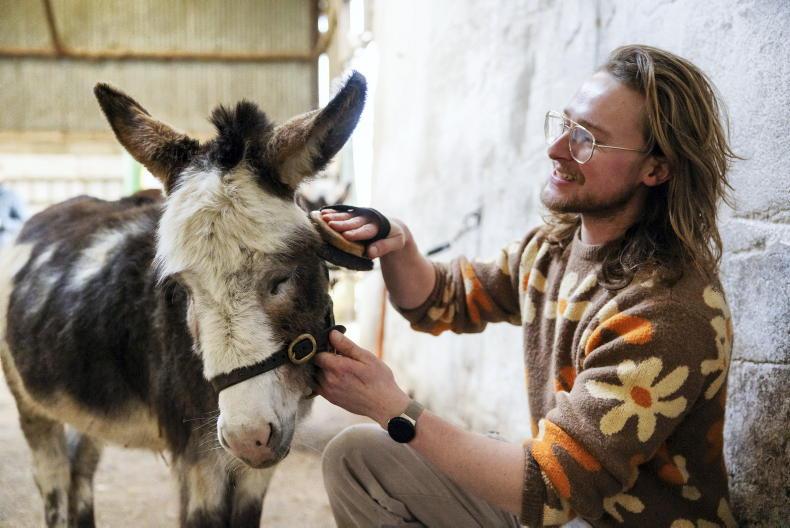
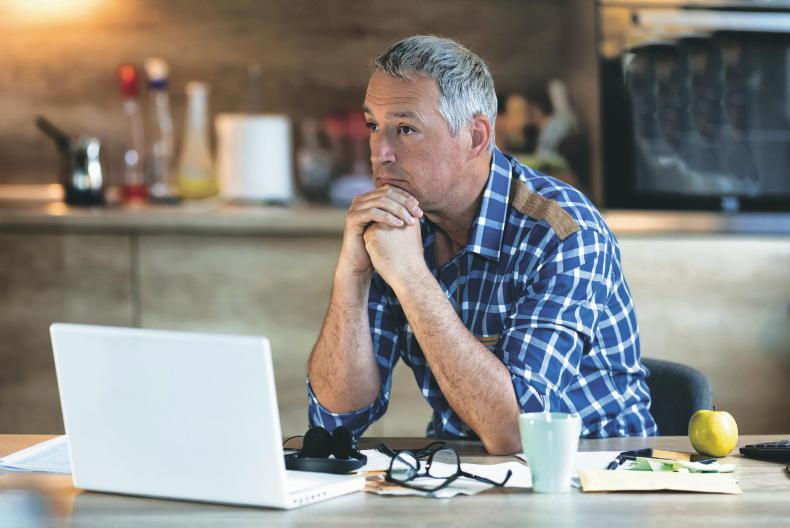
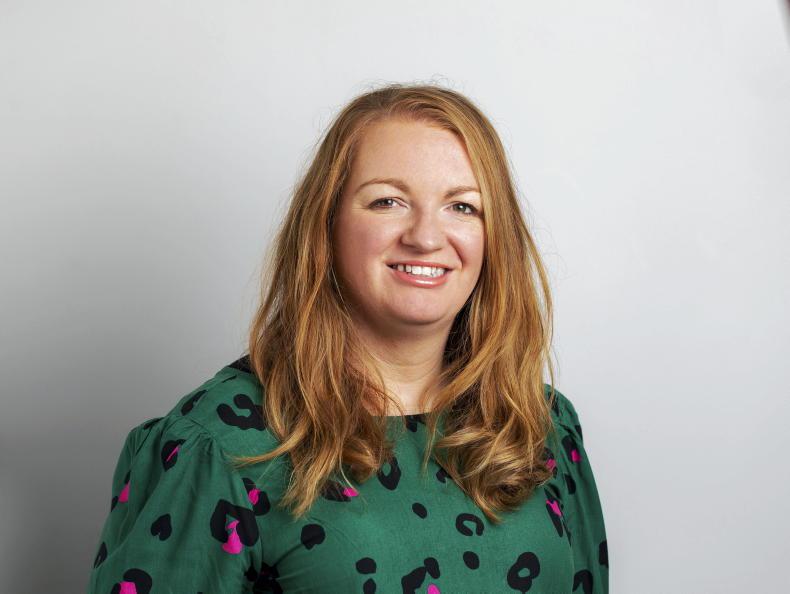
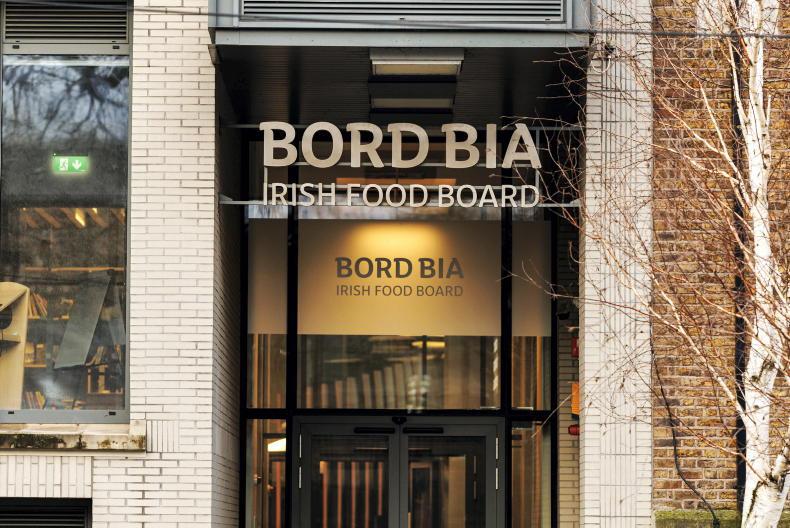
SHARING OPTIONS